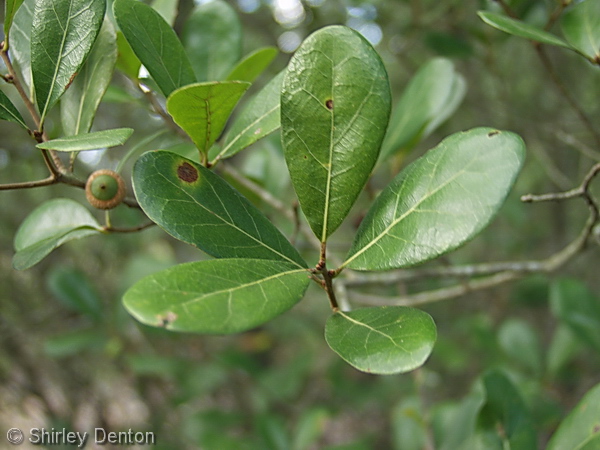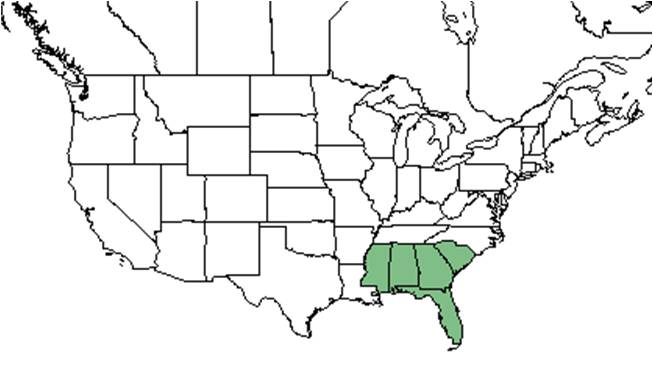Quercus myrtifolia
| Quercus myrtifolia | |
|---|---|

| |
| Photo by Shirley Denton (Copyrighted, use by photographer’s permission only), Nature Photography by Shirley Denton | |
| Scientific classification | |
| Kingdom: | Plantae |
| Division: | Magnoliophyta - Flowering plants |
| Class: | Magnoliopsida – Dicotyledons |
| Order: | Fagales |
| Family: | Fagaceae |
| Genus: | Quercus |
| Species: | Q. myrtifolia |
| Binomial name | |
| Quercus myrtifolia Willd. | |

| |
| Natural range of Quercus myrtifolia from USDA NRCS Plants Database. | |
Common name: myrtle oak
Contents
Taxonomic notes
Description
A description of Quercus myrtifolia is provided in The Flora of North America.
Q. myrtifolia can be distinguished from Q. inopina by flowering one to two weeks earlier, having larger, elliptical leaves and in areas of sympatry found on Paola or Lake soil[1].
Distribution
It is distributed in the southeastern U.S. south to Miami-Dade and Collier counties[2].
Ecology
Habitat
In the Coastal Plain in Florida, Q. myrtifolia habitats include scrub oak stands on stabilized dunes, slashpine flatwoods, longleaf pine-wiregrass sand ridges, sandy live oak-myrtle oak woods, mesic pine-oak scrubs, sand barrens, pine-scrub oak-palmetto communities, live oak hammocks, and an ecotone between wet woodlands along a small stream and a tangle of hardwoods on a sand ridge. It has also been recorded as an ornamental tree along city streets. Soil types include sand and loamy sand. Associated species include Quercus incana, Q. myrtifolia, Q. chapmanii, Q. geminata, Q. laevis, Q. minima, Q. hemisphaerica, Q. incana, Pinus clausa, Lyonia ferruginea and Ceratiola[3].
Phenology
Flowers March through May and fruits April through November[3]. Flowers one to two weeks earlier than Q. inopina[1].
Pollination
The following Hymenoptera families and species were observed visiting flowers of Quercus myrtifolia at Archbold Biological Station: [4]
Apidae: Apis mellifera, Bombus impatiens
Colletidae: Colletes brimleyi
Halictidae: Agapostemon splendens, Augochlora pura, Augochlorella aurata, Augochloropsis sumptuosa, Lasioglossum placidensis
Use by animals
Acorns are used by squirrels and Florida scrub jays[2].
Conservation and management
Cultivation and restoration
Photo Gallery
References and notes
Florida State University Robert K. Godfrey Herbarium database. URL: http://herbarium.bio.fsu.edu. Last accessed: November 2015. Collectors: Jame Amoroso, Loran C. Anderson, G. Avery, Wilson Baker, Morton Bortell, L.J. Brass, Michael B. Brooks, K. Craddock Burks, R.A. Davidson, Robert Doren, C. Florko, William B. Fox, R. Garren, Robert K. Godfrey, Bruce Hansen,JoAnn Hansen, J. Harrison, Norlan C. Henderson, Mabel Kral, Robert Kral, O. Lakela, Robert L. Lazor, Robert J. Lemaire, Sidney McDaniel, Leon Neel, Kent D. Perkins, W.D. Reese, Grady W. Reinert, H.F.L. Rock, Cecil R. Slaughter, K. Studenroth, Bian Tan, R.F. Thorne, D.B. Ward, A.A. Will, Dwayne Wise. States and Counties: Florida: Bay, Broward, Clay, Collier, Columbia, Duval, Escambia, Flagler, Franklin, Gulf, Hernando, Highlands, Indian River, Lake, Levy, Liberty, Marion, Okaloosa, Orange, Palm Beach, Pinellas, Putnam, St. Johns, Taylor, Wakulla, Walton. Compiled by Tall Timbers Research Station and Land Conservancy.
- ↑ 1.0 1.1 [[1]]Encyclopedia of Life. Accessed: March 7, 2016
- ↑ 2.0 2.1 [[2]]Regional Conservation. Accessed: March 7, 2016
- ↑ 3.0 3.1 Florida State University Robert K. Godfrey Herbarium database. URL: http://herbarium.bio.fsu.edu. Last accessed: November 2015. Collectors: Jame Amoroso, Loran C. Anderson, G. Avery, Wilson Baker, Morton Bortell, L.J. Brass, Michael B. Brooks, K. Craddock Burks, R.A. Davidson, Robert Doren, C. Florko, William B. Fox, R. Garren, Robert K. Godfrey, Bruce Hansen,JoAnn Hansen, J. Harrison, Norlan C. Henderson, Mabel Kral, Robert Kral, O. Lakela, Robert L. Lazor, Robert J. Lemaire, Sidney McDaniel, Leon Neel, Kent D. Perkins, W.D. Reese, Grady W. Reinert, H.F.L. Rock, Cecil R. Slaughter, K. Studenroth, Bian Tan, R.F. Thorne, D.B. Ward, A.A. Will, Dwayne Wise. States and Counties: Florida: Bay, Broward, Clay, Collier, Columbia, Duval, Escambia, Flagler, Franklin, Gulf, Hernando, Highlands, Indian River, Lake, Levy, Liberty, Marion, Okaloosa, Orange, Palm Beach, Pinellas, Putnam, St. Johns, Taylor, Wakulla, Walton. Compiled by Tall Timbers Research Station and Land Conservancy
- ↑ Deyrup, M.A. and N.D. 2015. Database of observations of Hymenoptera visitations to flowers of plants on Archbold Biological Station, Florida, USA.